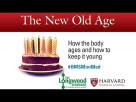A Professional Networking Site for Doctors & Medical Students Worldwide
The National Health Interview Survey found that nearly 30 percent of adults were sleeping less than 6 hours a day, and in a 2013 Gallup Poll, 40 percent of Americans reported getting less than 7 hours a night.
Why are we having so much trouble?
Seniors Have Trouble Sleeping Because of Health Issues
A number of characteristics of our modern-day lifestyles have been blamed for disrupting sleep. These include technology, electricity, work schedules, and more.
We know, for example, that using smartphones, tablets, and computers before bed can mess with our sleep hormones and disrupt deep REM sleep. Electricity allows us to have lights on all night long, and light signals the brain to stay awake. Shift work and graveyard shifts can also disrupt sleep and sleep quality, leading to hormonal shifts that affect our health.
Seniors often have even more factors working against them. Researchers reported in 2017 that adults in their 50s and older often experience the following sleep changes:
- Earlier bedtimes and rise times
- Taking longer to fall asleep
- Shorter overall sleep duration
- More awakenings, arousals, and transitions to lighter sleep stages
- More fragile sleep—more likely to be awakened
- Reduced amount of deeper REM sleep
- Increased time spent awake throughout the night
Researchers noted that some older adults will sleep just fine—these problems aren’t characteristic of everyone. Rather, these are symptoms adults may experience as they age, with some experiencing dramatic changes in sleep patterns.
In a 2012 study, researchers found that it wasn’t age, alone, causing the problem. Instead, it was other health problems like pain, respiratory issues, and depression that seemed to make sleeping more difficult. A number of factors can cause these issues:
Medications: Seniors are more likely to be taking medications, and many can disrupt sleep. The AARP notes that high blood pressure pills, corticosteroids, antidepressants, antihistamines, statins, and even dietary supplements designed to relieve joint pain can all cause insomnia.
Respiratory problems: Asthma, COPD, sleep apnea, chronic sinus infections, and other respiratory issues can easily interfere with sleep as they make it harder to breathe.
Pain: Any sort of pain, including muscle and joint pain, can keep you up at night.
Depression: Older adults are much more susceptible to depression and anxiety than we realized. Loss of loved ones, changes in working status, lack of social support, health problems and more can lead to emotional difficulties. Depression is a common cause of insomnia.
Alcohol: Older adults may use alcohol to help them fall asleep, and it usually does do that effectively. The problem is that it interferes with deep “REM” sleep, causing people to wake up later or experience a restless night’s sleep.
Dementia: Cognitive problems are strongly tied to sleep issues.
Heartburn: Both heartburn and gastroesophageal reflux disorder (GERD) disturb restful sleep.
Restless leg syndrome: Waking up with your legs kicking is never a pleasant sensation, but one that many seniors have to deal with. It can make it difficult to go to sleep, and may also interrupt sleep in the middle of the night. Estimates are that restless leg syndrome affects 10-35 percent of those over the age of 65, and is more common in women than men.
Hormonal changes: In women especially, hormonal changes associated with menopause can interfere with quality sleep. Estrogen deficiency has been found in some studies to contribute to the sleep problems women start to experience in their perimenopausal period.
Bladder problems: Urinary incontinence can lead to disrupted sleep as seniors have to get up and go to the bathroom in the middle of the night.
Do Seniors Need as Much Sleep as Younger Adults?
Scientists now believe that older adults need their seven hours a night just as much as younger adults. They came to that conclusion by looking at what happens to seniors who don’t get the usual 7-8 hours. Turns out that sleep deprivation can be just as dangerous if not more so for older people.
Sleep problems and insomnia simply reduce quality of life for older adults. A 2008 study found that impaired sleep was associated with declines in social functioning and memory. It affected self-confidence and reduced ability to carry out regular daily activities. It even affected participants’ ability to have healthy and stable relationships with their spouses, friends, and loved ones.
The National Institutes of Health states that not sleeping well can lead to depressed mood, excessive daytime sleepiness, more nighttime falls, and overall poorer quality of life in older adults. They add that poor sleep is not a normal part of aging.
Getting a good night’s sleep has been connected with helping to cement learning and memory, and it’s no different in older adults. Lack of sleep is associated with worse cognitive function in seniors, and worse performance in learning and long-term memory consolidation. It’s just because the people are older, either. No matter what our age, we need our sleep to stay mentally sharp.
There are other problems associated with not getting enough sleep as we age. The National Institutes of Health states that not sleeping well can lead to depressed mood, excessive daytime sleepiness, more nighttime falls, and overall poorer quality of life in older adults. They add that poor sleep is not a normal part of aging.
“Nearly every disease killing us later in life has a causal link to lack of sleep,” said Matthew Walker, study author and UC Berkeley professor of psychology and neuroscience, adding that sleep deterioration in older age has been linked to obesity, dementia, diabetes, heart disease, and stroke.
Indeed, getting a good night’s sleep on most nights may be a literal fountain of youth for seniors. It not only helps improve memory and cognitive function, but refreshes the immune system, improves mood, supports cellular repair, and helps the body heal faster. It can also help reduce risk of disease, support a healthy weight, and improve quality of life for years to come.
Views: 54
© 2018 Doctors Hangout | About DH
Powered by
![]()











